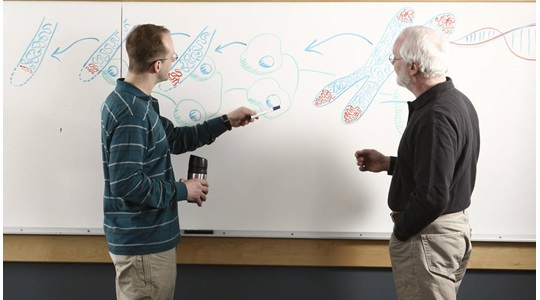The Harrison Lab
Researches the genetics of aging and lifespan, seeking to understand the basic mechanisms of aging, and adult stem cells, with the goal of delaying normal aging processes.
Principal Investigator
Location
Our Research Focus
Our research focuses on two primary areas: 1) gerontology: the mechanisms of aging, and 2) hematology: stem cells. Gerontology focuses on developing and testing hypotheses about the causes of aging in mice. Our long-term goal is for our research to lead to an extended period of healthy life—healthspan—as we age. Our research in hematology focuses on molecular genetic mechanisms that regulate differentiation, self-renewal and aging in stem cells. Our long-term goal is for our research to lead to safer and more effective treatments for human diseases as we age, thus extending our healthspan.
Full Scientific Report
Gerontology
We die from the first thing that kills us. As we age, we become progressively more susceptible to disease, so if we don't die from one disease, we die from the next most competitive disease — or the next. For example, if we don't die from cancer, we might die from heart disease, stroke or kidney failure, each of which could have been progressing simultaneously with the others, but at its own rate. The disease we die from is the one that progresses to a level of seriousness that causes the failure of a vital biological system. To maintain health and extend our lives, we must delay or prevent all the diseases of old age.
It is this philosophy that leads us to search for mouse models of delayed senescence and to study the mechanisms by which senescence is delayed in those models. We have no pre-conceived notions; we start with a model that works and investigate why it does. As we learn about the mechanisms, we develop hypotheses. The more we learn, the more refined our hypotheses become. Our long-term goal is to develop interventions, suitable for human beings, that delay aging and prolong health.
Hematology
Our studies of hematopoietic stem cells (HSCs) focus on molecular genetic mechanisms that regulate differentiation, self-renewal and aging. Hematopoietic precursors are a useful model for adult stem cells in general for two reasons. First, they are essential, producing not only all erythroid, myeloid and lymphoid cells, but natural killer cells and mast cells; they also produce the macrophages found in liver, lung, bone, brain and other tissues. Second, they are a well-defined example of self-renewing and differentiating cells that illustrate methods applicable to other stem cell systems. Because differentiated cells turn over continually, constant stem cell proliferation is necessary. In fact, partial proliferative exhaustion can explain losses with age in the many tissues in which repair and function depend on regeneration from adult precursor cells. In general, any impairment of stem cell function with age would reduce health in many biological systems. Conversely, any improvement of stem cell function with age could prolong health in many biological systems.


